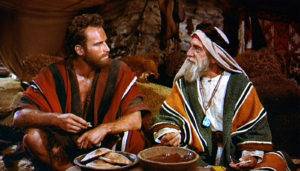 It’s National Be Nice to In-Laws weekend!
It’s National Be Nice to In-Laws weekend!
There is a wonderful commercial on the airways. The “Good Hands” insurance folks have Tina Fey driving with her mother-in-law, aka Mayhem, portrayed by Dean Winters. It is a caricature of the tensions intrinsic in this relationship. But it is not always so, as we see in this week’s Parsha, Yitro. This week we see how the wisdom of the elder father can be shared with the son. Yitro is transferring knowledge borne from the experience of leading others, he is a Midianite priest after all, to Moses, a relative “newbie” to this challenge.
The wise should share their wisdom. That is straightforward enough. But it is in the transferring that things can often be complicated. If I try to impose my wisdom, it likely won’t be heard, shunted aside instead of embraced. I must find a way to communicate successfully, requiring understanding and sensitivity. And on the other side of this relationship, the one benefitting from wisdom needs to be ready for the learning. Jethro had to listen and find a way to connect with his son-in-law, and Moses needed to be overwhelmed enough to realize he was in over his head and was in a desperate place. Only then could that wisdom be shared.
Both sides of the relationship are challenged to set aside ego and power so that they can find a place to work together for a common purpose. How timely a message for all of us.
Shabbat Shalom!
(I have been away for a few weeks traveling in Israel and Rome. I bring home many new experiences I look forward to sharing soon.)

